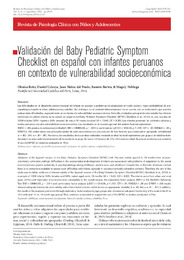Título :
Validación del Baby Pediatric Symptom Checklist en español con infantes peruanos en contexto de vulnerabilidad socioeconómica |
Autor :
Retiz, Olenka
Uchuya, Daniel
Núñez del Prado, Juan
Bartra, Ramón
Nóblega, Magaly |
Editor :
Universidad Miguel Hernández |
Departamento:
Departamentos de la UMH::Psicología de la Salud |
Fecha de publicación:
2024-09 |
URI :
https://hdl.handle.net/11000/33826 |
Resumen :
Las dificultades en el desarrollo socioemocional del infante se asocian a problemas de adaptación al medio social y mayor probabilidad de psicopatología durante la niñez, adolescencia y adultez. Sin embargo, en el contexto latinoamericano no se cuenta con un instrumento que permita evaluar tales dificultades, especialmente en contextos de vulnerabilidad socioeconómica. Ante ello, el objetivo principal de este estudio fue obtener evidencias de validez interna de la versión en español del Baby Pediatric Symptom Checklist (BPSC; Sheldrick et al., 2013) en una muestra de 1239 infantes (50% mujeres y 50% varones) de seis a 18 meses de edad (M = 12.40, DT = 3.20). Los infantes provenían de contextos urbanos y rurales peruanos con alta vulnerabilidad socioeconómica. Los resultados en la muestra general del análisis factorial exploratorio (KMO = .93, prueba de esfericidad de Bartlett [66] = 28960.62, p ˂ .001) y confirmatorio (χ2(51) = 254.58, p < .001, CFI = .97, RMSEA = .06 y SRMR = .03) evidenciaron una adecuada validez de estructura interna con una solución de tres factores que evidenciaron apropiada confiabilidad (α = .82 - .84; ω = .81 - .87). Asimismo, los resultados de los análisis realizados mediante análisis factorial exploratorio por grupos de edad también develaron un adecuado funcionamiento de la escala en el grupo de seis a 12 meses y de 12 a 18 meses de edad. Se provee evidencia que sustenta el uso del BPSC en estudios realizados en Perú.
Validation of the Spanish version of the Baby Pediatric Symptom Checklist (BPSC) with Peruvian infants aged 6 to 18 months from socioeconomically vulnerable settings. Difficulties in the socioemotional development of infants are associated with problems of adaptation to the social environment and greater probability of psychopathology during childhood, adolescence, and adulthood. Despite this, in the Latin American context there is no instrument available to assess such difficulties with infants, specially in socioeconomically vulnerable contexts. Therefore, the aim of this study was to obtain evidence of internal validity of the Spanish versión of the Baby Pediatric Symptom Checklist (BPSC; Sheldrick et al., 2013) in a sample of 1239 infants (50% females and 50% males) aged six to 18 months (M = 12.40, SD = 3.20). The infants came from urban and rural areas of Peru with high rates of socioeconomic vulnerability. In the overall sample, the exploratory factor analysis (KMO = .93, Bartlett’s Sphericity Test [66] = 28960.62, p ˂ .001) and confirmatory factor analysis (χ2(51) = 254.58, p < .001, CFI = .97, RMSEA = .06 and SRMR = .03) results showed adequate internal structure validity with a three-factor solution which shows an appropriate reliability (α = .82-.84; ω = .81 - .87). In addition, the results of the analyses performed through exploratory factor analysis by age groups also revealed an adequate functioning of the scale in the 6- to 12-month and 12- to 18-month age groups.Thus, evidence is provided to support the use of the BPSC in studies conducted in Peru.
|
Palabras clave/Materias:
infancia
desarrollo socioemocional
evidencias de validez interna
confiabilidad
Perú
childhood
socioemotional development
reliability
Perú |
Área de conocimiento :
CDU: Filosofía y psicología: Psicología |
Tipo de documento :
info:eu-repo/semantics/article |
Derechos de acceso:
info:eu-repo/semantics/openAccess |
DOI :
https://doi.org/10.21134/rpcna.2024.11.3.6 |
Publicado en:
Revista de Psicología Clínica con Niños y Adolescentes Vol. 11 nº. 3- septiembre 2024 - pp 23-27 |
Aparece en las colecciones:
Revista de Psicología Clínica con Niños y Adolescentes (RPCNA) Vol. 11, Nº 3 (Septiembre 2024)
|
 La licencia se describe como: Atribución-NonComercial-NoDerivada 4.0 Internacional.
La licencia se describe como: Atribución-NonComercial-NoDerivada 4.0 Internacional.
.png)
